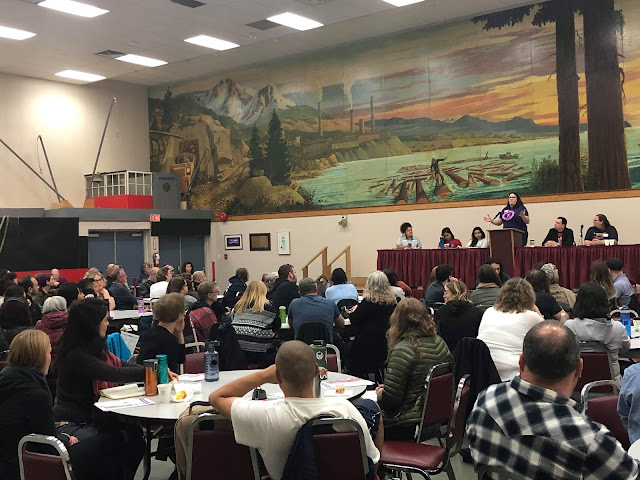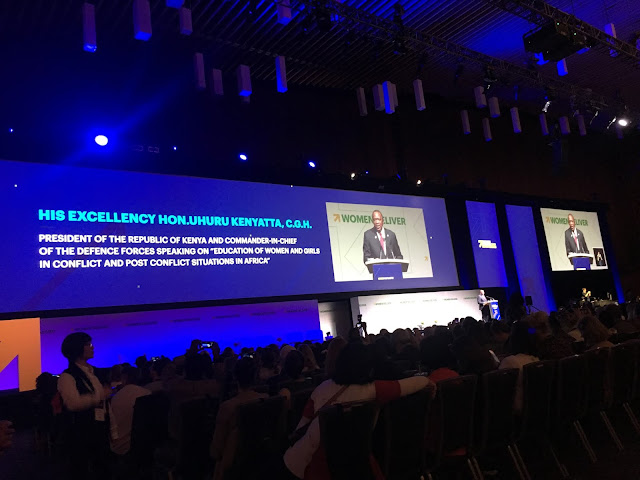The Future of Arbitration: Is the Current Selection Model Broken?
For any of us who work in labour relations on a regular basis, it’s not unusual to see that arbitrators calendars are booked so far in advance - even as far as 2 years out. That’s just stupid. Some stats:
In 2017 285 appointments for arbitration, mediation and investigations were funnelled through Collective Agreement Arbitration Bureau (CAAB).
So what can be done?
The panel was great - chock full of experience.
Mark Clark - Deputy Registrar of the Labour Relations Board, Director of CAAB
Mark started his section of the panel with an extensive background of the Collective Agreement Arbitration Bureau (CAAB) which was formed as a stand alone entity in 1994. In 2002/3 the government wasn’t sure whether or not to ditch it, so they kept it and with some changes to the labour code, it got absorbed under the purview of the Labour Relations Board (LRB). Mark’s job is quite important to labour relations in the province because as the director of CAAB, he appoints arbitrators, mediators, and investigators for a number of situations all while balancing a number of factors (nature of the dispute, the parties involved, type of industry, legal complexity, and experience) and his number one guiding principle; consensual appointments (they all said that almost always leads to quicker settlements). Yikes. That is big job and to be honest, not one I was aware of.
Then we went on to talking about the Ministry’s Joint Advisory Committee on CAAB - which is chaired by the director of CAAB and then populated by 2 public sector, 2 private sector (unions and employers), 2 arbitrators. This committee is tasked with a few things, mainly placement of arbitrators on the registry and the approval of continual appointments. Because of the make up of the committee it’s always had a community driven mandate of improving the system. The shortage of credible arbitrators has been concern of the labour relations community for decades - they tried in the early 1990s to hold training sessions but what they found was that the setting was too academic, too short, too expensive and at the endow it nothing really changed. So with the support of the LR community (including the Arbitrators Association of BC) they came up with a new program. It’s ambitious. It’s intense. And it works.
The gist of what I heard was that someone who meets the basic criteria (experience in collective bargaining as a spokesperson, labour relations - grievances etc, principles of hearings and familiarity of the roles and relationships in labour relationships). They will be assigned mentor arbitrators (someone with 10+ years of experience and the ability to provide exposure to hearings, mediations and decisions) and for a full year, they will be essentially apprenticing and at the end of one year, they will be placed on the CAAB registry.
Don Munroe, Q.C.
Don Munroe is legendary in my local - there are a couple of particular decisions that we refer to all of the time (that predate me by a lot) so it was cool to see him and hear him in person. He was exactly how I had pictured him in both his stature and his demeanor. A long time friend of mine's mom used to be involved in employer side labour relations for Canadian Airlines so she’s also told me some stories about Mr. Munroe.
Anyway, he was more skeptical of this so-called “crisis” in arbitrators. He cited his time in the early 1980s where it was the same where there's always been lament for more arbitrators. He does agree that there is a shortage but also called both parties out for not using all the resources available to them and to stop playing games.
He also said that the posted calendars are somewhat misleading because of settlements there are always extra days available in a month and it's a matter of getting to them.
Back in the day he and Vince Ready put together an "office of airline arbitration" when they were dealing with Canadian Airlines. When grievances got advanced to arbitration, the union would fill out a form and their assistants would work with their calendars to book dates as soon as possible (based on whoever was available the soonest - kind of like how the courts and the availability of judges work). This process worked and issues were resolved in reasonable timelines.
He then started to talk about expedited arb and how those are turning into regular arbitrations because the "a-team" that everyone always uses is so backed up. The same names appear in our collective agreements which contributes to the backlog and it's time to start using new people and trusting the system.
Back in the day he and Vince Ready put together an "office of airline arbitration" when they were dealing with Canadian Airlines. When grievances got advanced to arbitration, the union would fill out a form and their assistants would work with their calendars to book dates as soon as possible (based on whoever was available the soonest - kind of like how the courts and the availability of judges work). This process worked and issues were resolved in reasonable timelines.
He then started to talk about expedited arb and how those are turning into regular arbitrations because the "a-team" that everyone always uses is so backed up. The same names appear in our collective agreements which contributes to the backlog and it's time to start using new people and trusting the system.
Irene Holden - President Arbitrators Association of BC
Irene is the President of the Association of Arbitrators of BC (AABC). The association is a voluntary organization whose membership mirrors the current registry of active arbitrators, and they are constantly trying to figure out how to get some new blood into the organization. She maintains that there really is a crisis.
 The association has made some changes over the past few years - for one they ditched the provision that the association was going to be the body monitors and disciplines their colleagues. The association is not a formal licensing body like a college or the law society and they really didn’t want to keep on with that function. This was all precipitated by a complaint that was filed against an arbitrator for his behaviour during and after hearings and settlement. Because no one wanted to take on the investigation they ended up contracting an external investigator.
The association has made some changes over the past few years - for one they ditched the provision that the association was going to be the body monitors and disciplines their colleagues. The association is not a formal licensing body like a college or the law society and they really didn’t want to keep on with that function. This was all precipitated by a complaint that was filed against an arbitrator for his behaviour during and after hearings and settlement. Because no one wanted to take on the investigation they ended up contracting an external investigator.
So what’s the membership like?
Most arbitrators are in the last years of their careers, given the experience the parties need to make decisions. You also have to hustle to prove yourself - knock on doors to prove to both sides that you can be a neutral third party especially since folks going into the profession have a reputation in the labour relations community where people have to unlearn their relationship with you.
Most arbitrators are in the last years of their careers, given the experience the parties need to make decisions. You also have to hustle to prove yourself - knock on doors to prove to both sides that you can be a neutral third party especially since folks going into the profession have a reputation in the labour relations community where people have to unlearn their relationship with you.
The generational shift in the workforce is proving to be a catalyst for evolution in arbitration. The first years are very lean and people have to be prepared to be on a much leaner income as they start their arbitration practice. It’s also a job that can turn into a 24/7 role - baby boomers are tired of working so much (length and volume of cases) and the next generation isn’t interested in working all the time; they believe in work-life balance. Part of the reason availability is so limited is that arbitrators are taking control of their own calendars where they are doing things like not working Fridays, they are taking on certain employers/unions as clients only, taking weekends off, and taking more vacation time as they ease themselves out.
So how are you going to attract new arbitrators?
The government is going to have to invest in the mentorship program where the program laid out is excellent and the feeling is that they will be able to get qualified and effective arbitrators on to the registry. They are also going to have to look at adapting the strict eligibility requirements (CAAB and the LRB) - for example instead of looking at 3-5 significant settlement decisions, look at one major award (settlement, consent award - any process with written product at the end of some sort).
As far as dealing with the issues now, it’s time for parties to really look at their expedited processes and massage them - ensure that the grievances being brought forward, best suit the process to deal with them (mediation, arbitration).
Jessica Gregory
She is the newest protege of the mentorship program. She compared the program to grad school where you work all day and night while on a lean income. She's had steady cases and has even been named in collective agreements over the past year and hopes to continue on the CAAB roster.
Q&A
The Q&A was short and varied. We discussed the criteria for the CAAB list and the criteria for eligibility into the mentorship program. We also discussed the need for all of us to take a chance on using new arbitrators as the "A-List" folks are getting closer to actually retiring. The law has gotten more sophisticated over the past few decades so it seemed to me that regular people will no longer have a chance at becoming an arbitrator, that lawyers are the norm now.
All in all a really interesting night. We haven't gone to arbitration many times in our local but when we have we've encountered the same issues as everyone else. Long wait times (not to mention the issue of our named arbitrators recusing themselves from cases at UBC for a bit there) - it will be interesting to see if we use a new arbitrator the next time we find ourselves needing a neutral third party.
The Q&A was short and varied. We discussed the criteria for the CAAB list and the criteria for eligibility into the mentorship program. We also discussed the need for all of us to take a chance on using new arbitrators as the "A-List" folks are getting closer to actually retiring. The law has gotten more sophisticated over the past few decades so it seemed to me that regular people will no longer have a chance at becoming an arbitrator, that lawyers are the norm now.
All in all a really interesting night. We haven't gone to arbitration many times in our local but when we have we've encountered the same issues as everyone else. Long wait times (not to mention the issue of our named arbitrators recusing themselves from cases at UBC for a bit there) - it will be interesting to see if we use a new arbitrator the next time we find ourselves needing a neutral third party.




Comments
Post a Comment